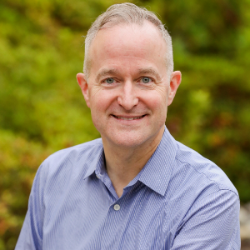Scott Erickson
Every month, RG175 spotlights one of the independent school leaders we've placed, taking a deeper dive into their journey, insights, and impact. This month, we feature Dr. Scott Erickson. Scott is the new Head of School at Berwick Academy, a PK-12 school founded in 1791 in South Berwick, ME. He most recently spent a year as the Interim Head at Indian Mountain School, a PK-9 day and boarding school in Northwest CT. His first headship was at Phillips Brooks School in the San Francisco Bay Area from 2011 to 2024. Scott previously served as Middle School Director at National Cathedral School (DC), and he began his career in education as a teacher, department chair, dorm parent, and chaplain at St. Paul’s School (NH).
Scott grew up on an Iowa farm. He admired the excellent teachers in his rural public high school and knew by his senior year that he wanted to be a teacher, too. In college, people knew Scott as an accomplished musician and student government leader. He completed his doctorate at Uppsala University in Sweden and a postdoctoral fellowship from Harvard University before joining the faculty at St. Paul’s School.
What is your connection to RG175?
I’ve partnered with RG175 on important leadership searches at my previous school, always finding wonderful talent in an ever-shifting hiring environment. Additionally, many of the consultants at RG175 are, and were, peer Heads of School, former colleagues, and friends, many of whom I would frequently see and collaborate with at industry conferences and through professional development opportunities. John Green, one of the RG175 consultants for the Berwick Academy head search, is a former faculty colleague from St. Paul’s School.
Can you summarize your experience working with RG175?
My experience with RG175 has always been overwhelmingly positive. The consultants are a great source of support both in searches where I was not chosen and most recently when I was selected at Berwick Academy. As former Heads of School and committed educators, they are important partners through the process. Their experience, expertise, and varied perspectives helped me better understand open leadership opportunities, and they demonstrated empathy about what it was like to be a candidate in the search process. I appreciated their skill in supporting both their clients (the schools) and me as a candidate. One example is the feedback they offered from a semi-finalist interview, which was instrumental in preparing for the finalist interview. Their position statements are thorough, helpful, full of valuable information, and inspirational. They also provided guidance on application materials to ensure that I was properly communicating how I would use my leadership experiences to address each school’s particular needs.
If you had one thing to recommend to other candidates, what would it be?
Be prepared for the unpredictable and the unknown. It is critical to be aware that, as a candidate, you will not fully understand why the school is searching for a new Head of School or experiencing a leadership transition. The context to these transitions will not be apparent on a website or in a position statement. Any school’s culture is greatly impacted by the dilemmas and issues that are not visible, yet significant in influencing what they’re looking for in their new leader. These factors come into play as a lens through which search committees read application materials and conduct interviews.
In the search for my first headship in 2010, the landscape seemed simpler and more straightforward. In 2024, there were more openings yet many more qualified candidates, more complex challenges, more obvious leadership turnover, and higher expectations in the board room. Based on my experience, schools today want to know a lot more about a candidate during the search process than they did in my first headship search process. Candidates need to prepare a thorough, personalized cover letter addressing why they are seeking a particular role and a resume that is explicit about results and impact.
What do you enjoy most about your job as it pertains to Independent Schools?
I love being a Head of School and everything that goes with it. I most appreciate the sheer variety of work. When I review my daily calendar, I see time spent with students, faculty, trustees, staff members, parents, community members, alumni, and neighbors in many different settings. I also enjoy the surprises, positive and negative, that are not on my calendar; for example, informal connections with students working on a project, helping a teacher navigate a tricky situation, being a sounding board to colleagues, listening to understand a parent’s perspective on the student experience, and more. My day is filled with impromptu, unscheduled moments that really demonstrate the living, breathing organism of a school community.
Being a classroom teacher brought me a tremendous amount of joy. I loved the focus and attention I gave to students and to delivering a curriculum. Now in my 15th year as a Head of School, I remind myself that I just have a different set of classrooms and that my teaching is in the board room, at a faculty meeting, during a family education session, at a student assembly, and during a city council hearing. I am still teaching, but the topics and “students” are different. All of this allows me to create a more cohesive, stronger school and helps us deliver on our mission each day. I’m proud to bring all of these components together.
